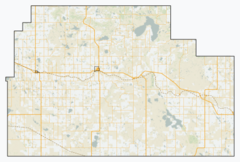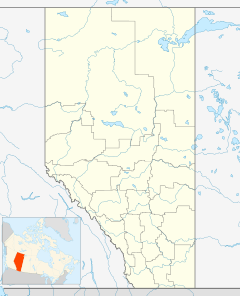Loyalist, Alberta facts for kids
Quick facts for kids
Loyalist
|
|
|---|---|
|
Hamlet
|
|
| Country | Canada |
| Province | Alberta |
| Region | Southern Alberta |
| Census division | No. 4 |
| Special Area | Special Area No. 4 |
| Government | |
| • Type | Unincorporated |
| Time zone | UTC-7 (Mountain Time Zone) |
| • Summer (DST) | UTC-6 (Mountain Time Zone) |
| Highways |
|
Loyalist is a small community known as a hamlet in Alberta, Canada. It is located within a special region called Special Area No. 4. You can find Loyalist about 11.4 kilometers (7.1 miles) east of the village of Veteran. It is also about 12.5 kilometers (7.8 miles) west of the village of Consort.
Loyalist, along with other nearby places, received its name in 1911. This happened after the Coronation of George V and Mary. Many places along the Canadian National Railway were given names that showed loyalty to the British Crown. These names included Coronation, Veteran, Consort, Throne, and Loyalist.
Contents
Loyalist's Early Days
How Loyalist Began
The area where Loyalist is located was once called Improvement District 333. In 1908, this district was opened for homesteading. Homesteading meant that people could claim land to settle and farm. This helped new communities grow.
The Arrival of the Railway
The Canadian National Railway (CN Railway) reached the Loyalist area in 1912. The railway was very important for small towns like Loyalist. It helped people travel and transport goods. This made it easier for businesses to thrive.
A Busy Community: 1912-1939
Between 1912 and 1939, Loyalist was a very busy place. It had many services and shops for its residents. During this time, the community had a post office, where people could send and receive mail. There was also a general store that sold many different items.
Loyalist also had a butcher shop and a grocery store for food. If you were hungry, you could visit one of the three restaurants. For building supplies, there was a lumber yard. Farmers used the five grain elevators to store their crops.
The town also had places for fun and services. There was a pool hall for entertainment and a school for children. A blacksmith shop helped fix tools and equipment. You could get a haircut at the barber shop. The community hall was a place for gatherings and events. Loyalist even had its own train station and a bank.
 | Delilah Pierce |
 | Gordon Parks |
 | Augusta Savage |
 | Charles Ethan Porter |



